八下英语Unit4-why-don't-you-talk-to-your-parents教案
最新人教新目标版中学八年级英语下册 Unit 4 Why don’t you talk to your parents教案1
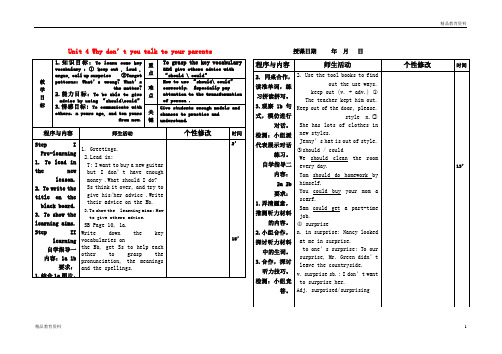
Unit 4 Why don’t you talk to your parents教学目标1.知识目标:To learn some keyvocabulary :①keep out , loud ,argue, call up surprise ②Targetpatterns: What’s wrong? What’sthe matter?2.能力目标:To be able to giveadvice by using “should\could”3.情感目标: To communicate withothers. n years ago, and ten yearsfrom now.重点To grasp the key vocabularyand give others advice with“should \ could”难点How to use “should\ could”correctly. Especially payattention to the transformationof person .关键Give students enough models andchances to practice andunderstand.程序与内容师生活动个性修改时间Step I Pre-learning 1. To lead in the newlesson.2. To write the title on the black board.3. To show the learning aims. Step IIlearning自学指导一内容:1a 1b要求:1.结合1a图片,1. Greetings.2.Lead in:T: I want to buy a new guitarbut I don’t have enoughmoney .What should I do?Ss think it over, and try togive his/her advice .Writetheir advice on the Bb.3.To show the learning aims: Howto give others advice.SB Page 10, 1a.Write down the keyvocabularies onthe Bb, get Ss to help eachother to grasp thepronunciation, the meaningsand the spellings.2’15’授课日期年月日程序与内容师生活动个性修改时间2. 同桌合作,读准单词,练习拼读拼写。
人教新目标版八年级英语下册 Unit 4 Why don’t you talk to your parents(第4课时)教案
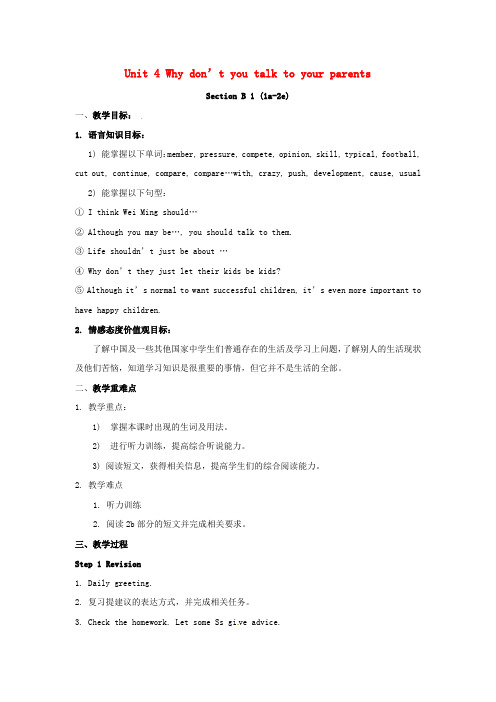
Unit 4 Why don’t you talk to your parentsSection B 1 (1a-2e)一、教学目标:1. 语言知识目标:1) 能掌握以下单词:member, pressure, compete, opinion, skill, typical, football, cut out, continue, compare, compare…with, crazy, push, development, cause, usual2) 能掌握以下句型:① I think Wei Ming should…② Although you may be…, you should talk to them.③ Life shouldn’t just be about …④ Why don’t they just let their kids be kids?⑤ Although it’s normal to want successful children, it’s even more important to have happy children.2. 情感态度价值观目标:了解中国及一些其他国家中学生们普通存在的生活及学习上问题,了解别人的生活现状及他们苦恼,知道学习知识是很重要的事情,但它并不是生活的全部。
二、教学重难点1. 教学重点:1) 掌握本课时出现的生词及用法。
2) 进行听力训练,提高综合听说能力。
3) 阅读短文,获得相关信息,提高学生们的综合阅读能力。
2. 教学难点1. 听力训练2. 阅读2b部分的短文并完成相关要求。
三、教学过程Step 1 Revision1. Daily greeting.2. 复习提建议的表达方式,并完成相关任务。
3. Check the homework. Let some Ss gi ve advice.Step 2 Warming up1. T: Show a picture of student.—What’s wrong with the girl?—She’s too stressed out.—What should she do? Can you give her some advice?2. Ss discuss the problem and give some advices:e.g.S1: Why not hang out with her friends.S2: She could play sports.S3: She could play computer games.S4: She should listen to music and read some books.Step 3 WritingWork on 1b1. Ask one student read the sent ences in 1a. Explain some main sentences.2. What activities do you like to help lower your stress? Order them from 1-8 with being the most favorite thing you do to lower stress.3. Ss discuss with their desk mates then order them.4. Let som e Ss say their answersStep 4 TalkingLet some Ss talk about their answers.S1: I always hang out with my friends to lower stress.S2: I like to listen to music to lower stress best.Step 5 ListeningWork on 1c:1. Tell Ss to read the sentences 1c first.2. Play the recording for the Ss. Ss just listen for the first time. Play the recording again and check the problems Wei Ming talks about.3. Check the answers:Work on 1d:1. Let Ss read the sentences in 1d first. Tell Ss to listen again and fill in theblanks.2. Play the recording again for the Ss to listen and write.3. Ss listen to the recording carefully and try to write the words in the blanks.4. Check the answers with the class.Step 6 Pair work1. Work in pairs. Suppose your partner is Wei Ming. You try to tell her some advice and say why.2. Let two students make a model for the Ss.3. Ss practice their conversations4. Teacher can walk around the c lassroom, and give some help to the Ss.Step 7 Thinking1. T: There are some after-school activities. What activities do y ou and yourclassmates usually do? Check them.2. Ss check the activities they usually do.3. Ask some Ss say their choices.Step 8 ReadingWarming upWhat did you do after school?Do you have stress in your life?How do you relax yourself?Fast Reading1. T: Now let’s work on 2b. First, let’s read the questions and make sure we knowthe meanings of all the questions. Then read the passage quickly an d find the answers to the questions.1) What is the common problem for Chinese and American families?2) Who gives their opinions about the problems?2. Ss read the letter quickly and try to find the answers to the two questions.3. Check the answers with the class.Careful Reading1. T: Now let’s read these sentences about the letter. Read the passage again. Judgeif the sentences are True or False. Please underline under the main sentences.1) Chinese children have to take so many after-school classes on weekends thesedays.2) Cathy Taylor really wants her three children to be successful, so she believesthese after-school activities are important for them.3) Linda Miller thinks parents should send their small kids to all kinds of classes.4) Linda thinks some parents push their kids too much.5) Alice thinks kids shouldn’t have time to relax and think for themselves2. Ss read the letter again and judge the sentences.3. Check the answers with the class.Post readingWork on 2c1. Now look at the words in bold in the article. Can you guess their meanings? Try to match them with the meaning below.2. Let Ss read and try to match the words.3. Give Ss some advice on how to do it.4. Check the answers with the Ss.5. Give some explanation about the difficult words.Work on 2d1. Tell Ss to read the passage again and answer these questions below.1) Does Cathy Taylor think it’s important for kids to join after school activities?2) Does Linda Miller agree with Cathy? What’s her opinion?3) Does Dr. Green agree with Cathy or Linda? What does she say?2. Ss work by themselves.3. Check the answers together.Step 9 Homework1. Read the article again after school.2. Write a short passage about Cathy’s daily life and her opinions about the education of the kids.。
初中英语《Unit 4Why don’t you talk to your parents》优质课教案、教学设计
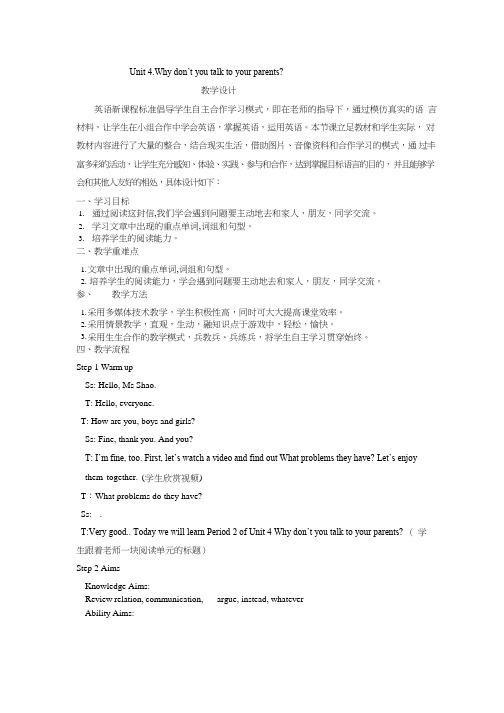
Unit 4.Why don’t you talk to your parents?教学设计英语新课程标准倡导学生自主合作学习模式,即在老师的指导下,通过模仿真实的语言材料,让学生在小组合作中学会英语,掌握英语,运用英语。
本节课立足教材和学生实际,对教材内容进行了大量的整合,结合现实生活,借助图片、音像资料和合作学习的模式,通过丰富多彩的活动,让学生充分感知、体验、实践、参与和合作,达到掌握目标语言的目的,并且能够学会和其他人友好的相处,具体设计如下:一、学习目标1.通过阅读这封信,我们学会遇到问题要主动地去和家人,朋友,同学交流。
2.学习文章中出现的重点单词,词组和句型。
3.培养学生的阅读能力。
二、教学重难点1.文章中出现的重点单词,词组和句型。
2.培养学生的阅读能力,学会遇到问题要主动地去和家人,朋友,同学交流。
参、教学方法1.采用多媒体技术教学,学生积极性高,同时可大大提高课堂效率。
2.采用情景教学,直观,生动,融知识点于游戏中,轻松,愉快。
3.采用生生合作的教学模式,兵教兵、兵练兵,将学生自主学习贯穿始终。
四、教学流程Step 1 Warm upSs: Hello, Ms Shao.T: Hello, everyone.T: How are you, boys and girls?Ss: Fine, thank you. And you?T: I’m fine, too. First, let’s watch a video and find out What problems they have? Let’s enjoy them together. (学生欣赏视频)T:What problems do they have?Ss: --.T:Very good.. Today we will learn Period 2 of Unit 4 Why don’t you talk to your parents? (学生跟着老师一块阅读单元的标题)Step 2 AimsKnowledge Aims:Review relation, communication, argue, instead, whatever---Ability Aims:1.I can talk about problems and give advice.2.I can read and understand the passage.Emotion Aims:Learn to get along well with others.(教师出示教学目标)(让学生了解本节课的学习目标,明确自己的学习任务,以便于他们检验自己的学习效果)Step 3 Guessing game:T: Now let’s look at the picture and try to guess what problems they have?.Ss1:-----.Ss2:------Ss3:------Step 4. Reading:Task 1:Fast Reading Q:What are the two letters about?(快速阅读课文,把握大意,抓住关键词,略读短文)Task 2: Skim the first letter and answer the questions.Q1: What’s his problem?Q2: Is his elder brother nice to him?Q3: How does he feel at home?Q4: Who helps Sad and Thirteen?(采用小组合作学习的模式,让学生自主讨论探究,既可以适时地调节气氛,又能调动出学生的参与意识,增强小组的凝聚力, 让充分发表自己的见解,让他们体会到成功的喜悦。
八年级英语下册《Unit 4 Why don’t you talk to your parents》教案1 (新版)人教新目标版
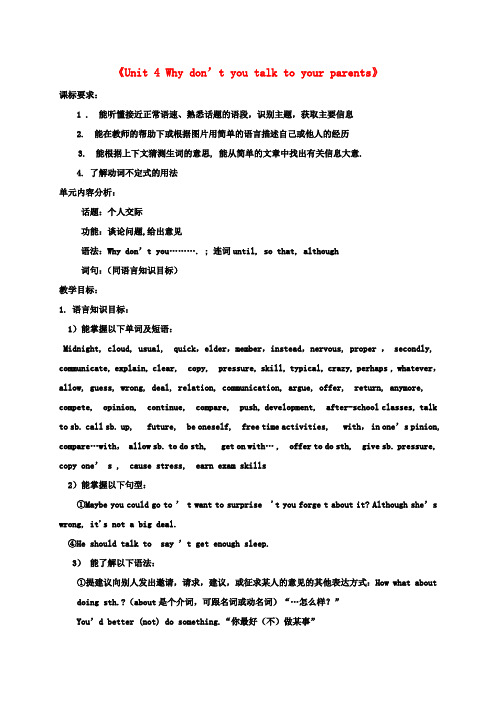
《Unit 4 Why don’t you talk to your parents》课标要求:1 . 能听懂接近正常语速、熟悉话题的语段,识别主题,获取主要信息2. 能在教师的帮助下或根据图片用简单的语言描述自己或他人的经历3. 能根据上下文猜测生词的意思, 能从简单的文章中找出有关信息大意.4. 了解动词不定式的用法单元内容分析:话题:个人交际功能:谈论问题,给出意见语法:Why don’t you………. ; 连词until, so that, although词句:(同语言知识目标)教学目标:1. 语言知识目标:1)能掌握以下单词及短语:Midnight, cloud, usual, quick,elder,member,instead,nervous, proper , secondly, communicate, explain, clear, copy, pressure, skill, typical, crazy, perhaps , whatever,allow, guess, wrong, deal, relation, communication, argue, offer, return, anymore, compete, opinion, continue, compare, push, development, after-school classes, talk to sb. call sb. up, future, be oneself, free time activities, with,in one’s pinion, compare…with, allow sb. to do sth, get on with…, offer to do sth, give sb. pressure, copy one’ s , cause stress, earn exam skills2)能掌握以下句型:①Maybe you could go to ’ t want to surprise 't you forge t about it? Although she’s wrong, it's not a big deal.④He should talk to say ’t get enough sleep.3)能了解以下语法:①提建议向别人发出邀请,请求,建议,或征求某人的意见的其他表达方式:How what aboutdoing sth.?(about是个介词,可跟名词或动名词)“…怎么样?”You’d better (not) do something.“你最好(不)做某事”Would you like sth …?:“你想要某物Let’s do sth…?What should I do …? ( should表示请求、征询对方意见)②学会谈论问题和学会用why don't you…提建议向别人发出邀请,请求,建议,或征求某人的意见的表达方式:Why don’t you do something?=Why not do something?你为什么不做某事呢?(来表示请求、征询对方意见)until, so that ,although引导的状语从句a. until:在带有till或until引导的时间状语从句里,如果主句用肯定式,其含义是“一直到……时”,谓语动词只能用延续性动词。
Unit-4-Why-don't-you-talk-to-your-parents--sectionA-4课时教案
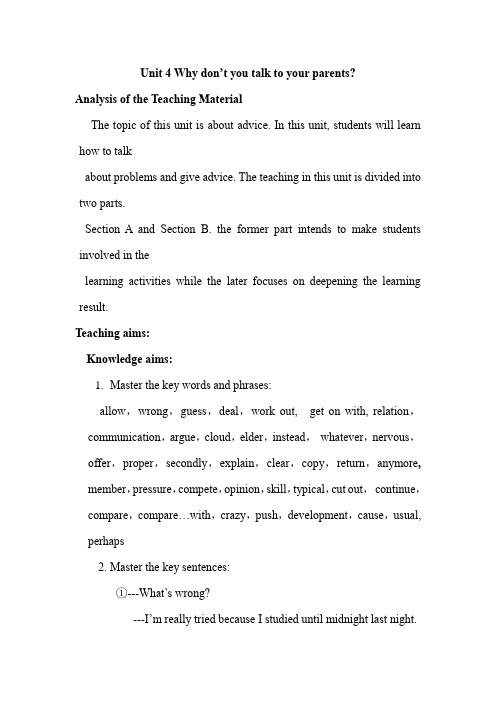
Unit 4 Why don’t you talk to your parents?Analysis of the Teaching MaterialThe topic of this unit is about advice. In this unit, students will learn how to talkabout problems and give advice. The teaching in this unit is divided into two parts.Section A and Section B. the former part intends to make students involved in thelearning activities while the later focuses on deepening the learning result.Teaching aims:Knowledge aims:1.Master the key words and phrases:allow,wrong,guess,deal,work out, get on with, relation,communication,argue,cloud,elder,instead,whatever,nervous,offer,proper,secondly,explain,clear,copy,return,anymore, member,pressure,compete,opinion,skill,typical,cut out,continue,compare,compare…with,crazy,push,development,cause,usual, perhaps2. Master the key sentences:①---What’s wrong?---I’m really tried because I studied until midnight last night.②You could give him a ticket to a ball game.③I think you should ask your parents for some money.④Why don’t you talk to him about it?Ability aims:1.Be able to talk about problems and give advice using “Why don’tyou…”.2.To improve students’ ability of listening, speaking, reading andwriting.3.To improve students’ ability of communication.4.To improve students’ ability of integrating skills.Moral aim:To be able to realize other people’s feeling in communication. Teaching important points:1.To master the key vocabulary and target language in this unit.2.Be able to talk about problems and give advice using “Why don’tyou…”.Teaching difficult points:1.Be able to talk about problems and give advice using “Why don’tyou…”.2.To improve students’ ability of listening, speaking, reading andwriting.Teaching methods:Multimedia method, groupwork, cooperative discussion.The first periodSection A (1a-1c)Teaching Aims:Knowledge aims:1)Master the key words and phrase:allow, wrong, What’s wrong?, midnight.2) Master the target language:①—What’s wrong?—I’m really tried because I studied until midnight last night.②Why don’t you go to sleep earlier this evening?Ability aims:1.Learn to talk about problems and give advice.2.Cultivate students’ listening and speaking skills.Moral aim:Learn to work with others; learn to face the problems in our life. Help others.Teaching important points:1) Talk about the problems.2) Learn the new language points.Teaching difficult point:Talk about the problems and give advice.Teaching methods:Practice, speaking and listening methodTeaching aids:A tape recorder, a projectorTeaching procedures:Step 1. Warming upShow some pictures on the screen and ask:What’s the matter / What’s wrong?S:He has too much homework to do.T:Does he like to do it?S1:No,he doesn’t. Because he doesn’t have any free time to dothings he likes.…Step 2. PresentationShow the new words on the screen, read the new words and ask students to repeat. Make sure that students understand the meanings of them.Step 3. TalkingSay:In our daily life there are always many problems. Look atthese problems. Do you think they are serious or not?Students discuss with their partners and try giving some advice,they can usethe words could, should and shouldn’t.①I have to study too much so I don’t get enough sleep.②I have too much homework so I don’t have any free time to do things I like.③My parents don’t allow me to hang out with my friends.④I have too many after-school classes.⑤I got into a fight with my best friend.Point out the heading in the box to the class. Tell students serious problem is a very bad problem.Ask students to write the problems in the serious or not serious columns.Finally, check the answers.Step 4. ListeningTell students to read the sentences in 1a again. Make sure they know the meaning of the sentences.Play the recording for the students to listen and circle the problems you hear in 1a.Play the recording again. Check the answers with the students.Step 5. Pair work1. Let students read the conversation in the box.2. Have students work in pairs, use the information in 1a to make otherconversations.3. In the end, ask several pairs of students to act out their conversations.e.g. A: What’s wrong?B: I’m really tied because I studied until midnight last night.A: Why don’t you go to sleep earlier this evening?Step 6. Language pointsShow some language points on the screen, explain to the class.1) allow v. 允许;准许allow sb. (not)to do sth. (不)允许某人做某事e.g. My parents don’t allow me to stay up late.我父母不允许我熬夜。
新人教版八年级英语下册教案 Unit 4 Why don’t you talk to your parents教案1
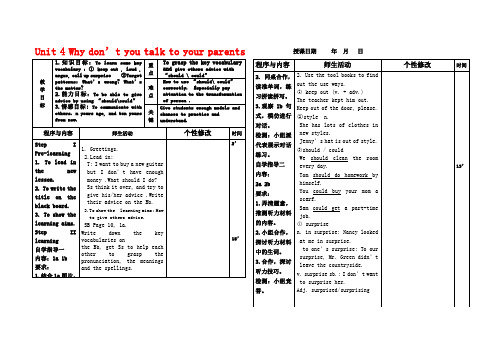
Keep out of the door, please.
style n.
She has lots of clothes in new styles.
Jenny’s hat is out of style.
should / could
Weshould cleanthe room every day.
3. To show the learning aims.
Step II learning
自学指导一
内容:1a 1b
要求:
1.结合1a图片,找出生词。
1. Greetings.
2.Lead in:
T: I want to buy a new guitar but I don’t have enough money .What should I do?
the Bb, get Ss to help each other to grasp the pronunciation, the meanings and the spellings.
2’
15’
授课日期年月日
程序与内容
师生活动
个性修改
时间
2.同桌合作,读准单词,练习拼读拼写。
3.观察1b句式,模仿进行对话。
2. SB Page 10-11, 1b .2a. 2b.
Play the tape twice .Ss circle the problems they hear.
Play the tape a third time .Check the answers.
Then help students understand and perceive when / how to use should or could.
unit4-Why-don't-you-talk-to-your-parents公开课教案
Unit 4 Why don’t you talk to your parentsSection A 1a—1c一、教学目标:1. 语言知识目标:1) 能掌握以下单词:allow, wrong能掌握以下句型:①—What’s wrong?—I have to study too much so I don’t get enough sleep.②I have too much homework so I don’t have any free time to do things I like. ③My parents don’t allow me to hang out with my friends.④Why don’t you talk to him about it……2. 能力目标(1)能够运用所学知识谈论问题和困难、提出建议并做出选择;(2)能根据对方所提出的问题,给出一些合理的建议。
3. 情感态度价值观目标:培养学生良好的合作意识,鼓励学生大胆表达自己的想法和意愿。
正确认识生活中的一些困难,能采用正确的方式解决生活中的问题。
二、教学重难点1) Talk about the problems.2) Learn the new language points.2. 教学难点:能根据对方所提出的问题,给出一些合理的建议。
学会表达建议的一些方式。
三、教学过程Step 1 Revision复习上单元的内容,老师可适当带出句型why don’t you…/What’s the matter?Step 2 Presentation1. 导入学生们平时在学校和生活中存在的问题。
T: What’s the matter/ What’s wrong?S: He has too much homework to do.hat'sT: Does he like to do it?S1:No, he doesn’t. Because he doesn’t have any free time to do things he likes.Step 3 Talking1. Look at these problems. Do you think they are serious or not? Ss discuss with their partners and give some advice.①I have to study too much so I don’t get enough sleep.②I have too much homework so I don’t have any free time to do things I like. ③My parents don’t allow me to hang out with my friends.④I have too many after-school classes.⑤I got into a fight with my best friend.Step 4 PracticeShow them some pictures about the problems,then ask some students to read them,and give someadvice.T: What’s the matter/ What’s wrong?S: He has too much homework to do.T:What should he do?S: He should talk to his parents.Step 5 ListeningStep 6 Pair work1. Show them some pictures then ask them to make some sentences..2. Let some pairs act out their conversations.eg. A: What’s wrong?B: I have to study too much, so I don’t get enough sleep.A: Why don’t you go to sleep earlier this evening?Step 7 Make a survey;Ask your classmates about his or her problems and what kind of advice can you give,then complete the chart.Step8 SummaryStep9 HomeworkWrite three conversations about your problems and your friends’ suggestions.A: I have too many after-school classes.What should I do?B: You should …。
八年级英语下册 Unit 4 Why don’t you talk to your parents(第4课时)教案1 (新版)人教新目标版
Unit 4 Why don’t you talk to your parents?Section B 1 (1a-1e)一、教学目标:1. 语言知识目标:1) 能掌握以下单词:member, pressure, compete, opinion,2) 能掌握以下句型:① I think Wei Ming should…② Although you may be…, you should talk to them.2. 情感态度价值观目标:了解中国及一些其他国家中学生们普通存在的生活及学习上问题,了解别人的生活现状及他们苦恼,知道学习知识是很重要的事情,但它并不是生活的全部。
二、教学重难点1. 教学重点:1) 掌握本课时出现的生词及用法。
2) 进行听力训练,提高综合听说能力。
2. 教学难点听力训练三、教学过程Step 1 Revision1. Daily greeting.2. 复习提建议的表达方式,并完成相关任务。
3. Check the homework. Let some Ss give advice.Step 2 Warming up1. T: Show a picture of student.—What’s wrong with the girl?—She’s too stressed out.—What should she do? Can you give her some advice?2. Ss discuss the problem and give some advices:e.g.S1: Why not hang out with her friends.S2: She could play sports.S3: She could play computer games.S4: She should listen to music and read some books.Step 3 WritingWork on 1b1. Ask one student read the sentences in 1a. Explain some main sentences.2. What activities do you like to help lower your stress? Order them from 1-8 with being the mostfavorite thing you do to lower stress.3. Ss discuss with their desk mates then order them.4. Let some Ss say their answersStep 4 TalkingLet some Ss talk about their answers.S1: I always hang out with my friends to lower stress.S2: I like to listen to music to lower stress best.Step 5 ListeningWork on 1c:1. Tell Ss to read the sentences 1c first.2. Play the recording for the Ss. Ss just listen for the first time. Play the recording againand check the problems Wei Ming talks about.3. Check the answers:Work on 1d:1. Let Ss read the sentences in 1d first. Tell Ss to listen again and fill in the blanks.2. Play the recording again for the Ss to listen and write.3. Ss listen to the recording carefully and try to write the words in the blanks.4. Check the answers with the class.Step 6 Pair work1. Work in pairs. Suppose your partner is Wei Ming. You try to tell her some advice and say why.2. Let two students make a model for the Ss.3. Ss practice their conversations4. Teacher can walk around the classroom, and give some help to the Ss.Step 7 Thinking1. T: There are some after-school activities. What activities do you and your classmates usuallydo? Check them.2. Ss check the activities they usually do.3. Ask some Ss say their choices.Step 9 Homework1. Read the listening after school.2. Do the exercises.。
- 1、下载文档前请自行甄别文档内容的完整性,平台不提供额外的编辑、内容补充、找答案等附加服务。
- 2、"仅部分预览"的文档,不可在线预览部分如存在完整性等问题,可反馈申请退款(可完整预览的文档不适用该条件!)。
- 3、如文档侵犯您的权益,请联系客服反馈,我们会尽快为您处理(人工客服工作时间:9:00-18:30)。
Unit 4 Why don’t you talk to your parents? Section A (1a-1c) Period 1 一、教学目标: 1. 语言知识目标: 1) 能掌握以下单词:allow, wrong. 能掌握以下句型: —What’s wrong? —I’m really tried because I studied until midnight last night. 2) 能了解以下语法: 能够运用所学知识谈论问题和困难、提出建议并做出选择; 2. 情感态度价值观目标: 培养学生良好的合作意识,鼓励学生大胆表达自己的想法和意愿。正确认识生活中的一些困难,能采用正确的方式解决生活中的问题。 二、教学重难点 1. 教学重点: 1) Talk about the problems. 2) Learn the new language points. 2. 教学难点: 能根据对方所提出的问题,给出一些合理的建议。 学会表达建议的一些方式。 三、教学过程[来源:学科网] Step 1 Warming up 1. 导入学生们平时在学校和生活中存在的问题。 T: What’s the matter/ What’s wrong? S: He has too much homework to do. T: Do he like to do it? S1:No, he doesn’t. Because he doesn’t have any free time to do things he likes. … Step 2 Talking 1. Look at these problems. Do you think they are serious or not? Ss discuss with their partners and give some advice. ① I have to study too much so I don’t get enough sleep. ② I have too much homework so I don’t have any free time to do things I like. ③ My parents don’t allow me to hang out with my friends. ④ I have too many after-school classes. ⑤ I got into a fight with my best friend. Step 3 Listening 1. T: Tell Ss to read the sentences in 1a again. Make sure they know the meaning of the sentences. 2. Play the recording for the Ss to listen and circle the problems you hear in 1a. 3. Play the recording again. Check the answers with the Ss. Step 4 Pair work 1. Let Ss read the conversation in the box. 2. Use the information in 1a to make other conversations. 3. Let some pairs act out their conversations. e.g. A: What’s wrong? B: I’m really tied because I studied until midnight last night. A: Why don’t you go to sleep earlier this evening? 4. Language points 1) allow v. 允许;准许 allow sb. (not)to do sth. (不)允许某人做某事 e.g. My parents don’t allow me to stay up late. 我父母不允许我熬夜。 Mr. Smith allowed Mike to drive there. 史密斯先生允许迈克开车去那里。 2) wrong adj. 错误的;不对的 = not right e.g. Some words on the advertisement are wrong. 广告上的一些字错了。
Unit 4 Why don’t you talk to your parents? Section A (2a-2d) Period 2 一、教学目标: 1. 语言知识目标: 1) 能掌握以下单词:guess, deal, work out. 能掌握以下句型: ① You could give him a ticket to a ball game. ② I think you should ask your parents for some money. ③ Why don’t you talk to him about it? 2) 能了解以下语法: (1)能够运用所学知识谈论问题和困难、提出建议并做出选择; (2)能根据对方所提出的问题,给出一些合理的建议。 2. 情感态度价值观目标: 培养学生良好的合作意识,鼓励学生大胆表达自己的想法和意愿。正确认识生活中的一些困难,能采用正确的方式解决生活中的问题。 二、教学重难点 1. 教学重点: 1) Talk about the problems. 2) Learn the new language points. 2. 教学难点: 1、能根据对方所提出的问题,给出一些合理的建议。 2、学会表达建议的一些方式。 三、教学过程[来源:学科网] Step 1 Warming up and Revision Have students review some problems that we have learnt last class. T: Everyone has his/her problem in daily life. What things make you unhappy? Step 2 Listening (2a,2b) Work on 2a: T: Peter has some problems. What advice does his friend give him? Fill in the blanks with could or should. 1. Let Ss read the sentences in 2a. 2. Play the recording for the Ss to listen and write the words in the blank. 3. Play the recording again to check the answers. Work on 2b: 1. Let Ss read the sentences below. Explain some main sentences for the Ss. Make sure they know the meaning of each sentence. 2. Play the recording for the Ss to write the letters (a-e) next to the advice in 2a. 3. Play the recording again to check the answers. Answers: 1. d 2. e 3. a 4. c 5. b Exercise: Listen again. Fill in the blanks. Boy 2 had a ______ with his best friend. He could ______ him a letter. But he isn’t good at writing letters. He ______ call him ____, but he doesn’t want to talk about it on the ______. He ______ talk to him so that he can say he’s sorry but it’s not ____. He ______go to his house but he doesn’t want to _______ him. He could take him to the _____________, but he doesn’t want to wait that long. Step 3 Pair work (2c) 1. Tell Ss to make a conversation using the information in 2a and 2b. 2. Let one pair to read out their conversation first. 3. e.g. A: What’s the matter, Peter? B: I had a fight with my best friend. What should I do? A: Well, you should call him so that you can say you’re sorry. B: But I don’t want to talk about it on the phone. 4. Ss act the conversation in pairs. Ask some pairs to act out their conversations. Step4 Role-play (2d) 1. Ss read the conversations and try to understand the meaning. 2. Read the conversation after the teacher. 3. Practice the conversation with their partner. Then let some pairs to act out the conversation. 4. Explain some new words and main points in the conversation. (1) guess e.g. Let us guess the height of the building. 让我们来猜一下这个建筑物的高度。 (2) big deal, deal
